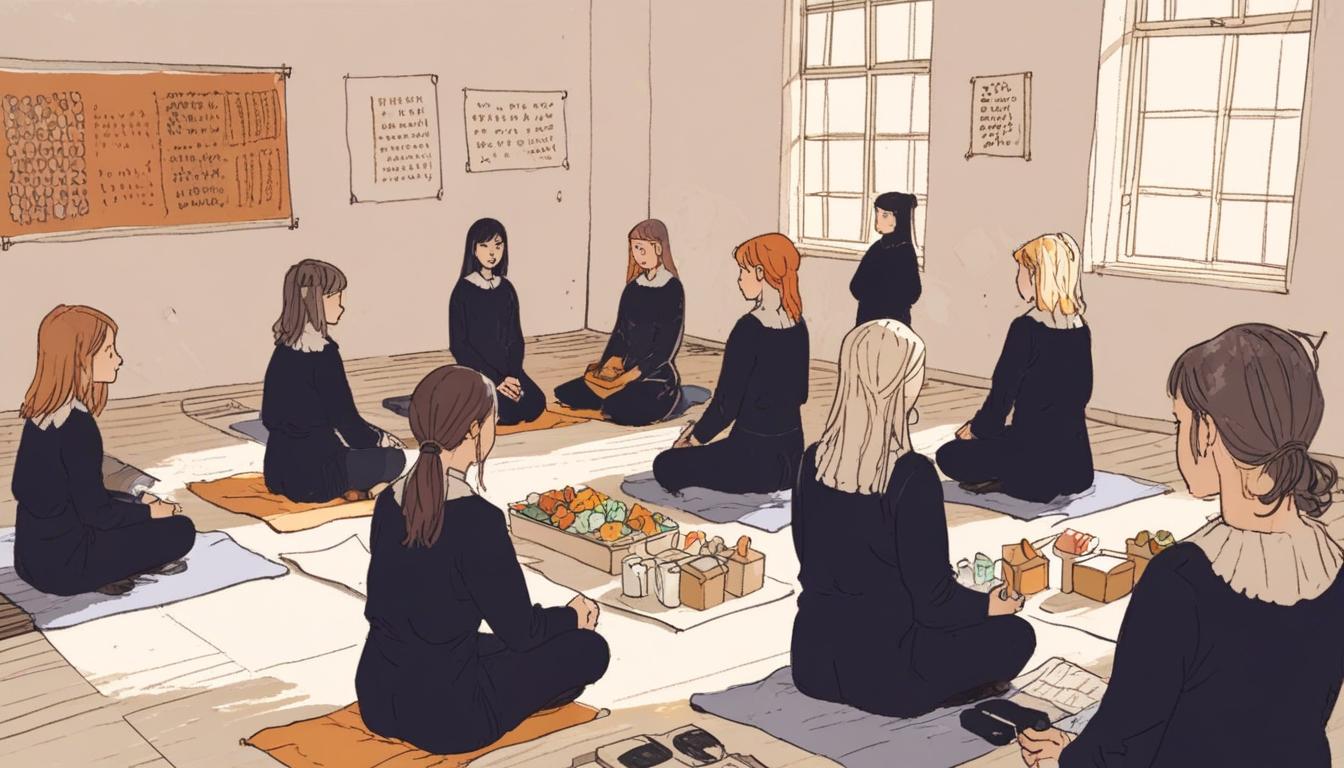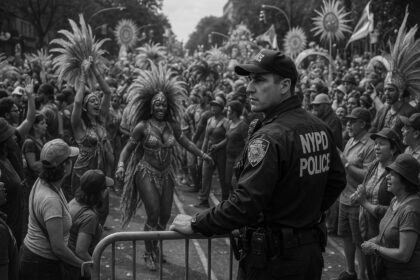A police raid on six young women meeting in a central London Quaker house has ignited widespread condemnation over aggressive policing tactics targeting peaceful activists campaigning on climate change and Gaza. The incident highlights escalating tensions over the limits of lawful protest and free assembly in the UK.
When six young women gathered in a Quaker meeting house in central London to discuss urgent issues such as the climate crisis and the ongoing war in Gaza, the setting was emblematic of a long tradition of peaceful protest rooted in social justice. Over cups of jasmine tea and vegan cheese straws, they sought to share ideas and plan for future activism. However, the atmosphere of solidarity was abruptly shattered when the Metropolitan Police, acting on what they described as “intelligence-led” information, raided the building. Up to 30 officers, some armed with stun guns, forcibly entered the Grade II-listed structure and arrested the young activists on suspicion of conspiracy to cause a public nuisance.
The brutality of the police’s actions has provoked widespread outrage, raising alarms about the treatment of peaceful protesters in the UK. One of the participants, 18-year-old Zahra Ali, recounted her harrowing experience of being detained for 17 hours, in a freezing cell with limited access to legal support. The raid, which occurred while the group was engaged in what they believed to be lawful discussion, was alarming not only for those targeted but for many observers who see it as indicative of a troubling escalation in police crackdowns on civil liberties.
The police’s justification for this aggressive intervention rests on their claim of a conspiracy to disrupt public order. Yet, members of the gathering argue that their meeting was anything but clandestine; they had openly advertised their discussions through social media and flyers, intending to welcome others interested in the topics at hand. The notion of a “conspiracy” feels absurd to many, especially as concurrent events like a life-drawing class were happening in the same space, suggesting the police response was misplaced and heavy-handed.
Youth Demand, the activist group involved, has garnered attention for its firm stance against the UK government’s policies regarding Israel and fossil fuels. Established in January 2024, the group calls for a two-way arms embargo on Israel and advocates for significant financial reforms, including a £1 trillion levy on the wealthiest individuals contributing to climate issues. Their recent activities, such as protests during the London Marathon and acts of civil disobedience like “dirty protests,” signal a new wave of youth activism unafraid to challenge the status quo.
In the wake of the raid, public figures and community leaders have come together to voice their concerns. Paul Parker, the recording clerk for Quakers in Britain, condemned the incident as a violation of sacred space and a grim warning regarding the right to free speech and assembly. Quakers, historically associated with peace and non-violence, have found themselves now at the frontlines of a debate surrounding policing powers and societal control in the UK.
At a subsequent vigil outside New Scotland Yard, organised by Quaker and climate groups, the atmosphere starkly contrasted the police’s heavy-handed tactics. Attendees sought to embody the Quaker principles of love and peace, in an act of defiance against the aggression shown by law enforcement. Carla Denyer, co-leader of the Green Party, articulated a broader concern when she stated that this incident signifies a growing repression of the right to peaceful protest in the UK. Despite changes in government, she noted, the legislative environment remains unyielding against gatherings aimed at social change.
Critics of the Metropolitan Police have labelled their actions as “absolutely outrageous,” reflecting a deeply held belief that such aggressive policing tactics could threaten the very fabric of democratic discourse in the UK. The police, while acknowledging the right to protest, claim they must intervene to prevent activities that could lead to “serious disruption.” Yet, this incident raises critical questions about what constitutes acceptable protest and the extent to which police should surveil and intervene in the lives of citizens before any actual disruption occurs.
As the six women remain under investigation, and the debate surrounding their arrests continues to rage, the implications of this raid echo far beyond the confines of the Quaker meeting house. They signal a cultural moment, one where the boundaries of lawful assembly are being redefined, raising urgent questions about the future of dissent in contemporary Britain.
Reference Map
- Paragraphs 1, 2, 3, 4, 5, 6, 7, 8, 9
- Paragraph 3
- Paragraph 6
- Paragraph 6
- Paragraph 6
- Paragraph 4
Source: Noah Wire Services
- https://www.theguardian.com/world/2025/may/10/police-raid-london-quaker-meeting-house-very-worrying – Please view link – unable to able to access data
- https://www.quaker.org.uk/news-and-events/news/quakers-condemn-police-raid-on-westminster-meeting-house – Quakers in Britain strongly condemned the police raid on Westminster Meeting House, where six young women were arrested during a meeting discussing climate change and the Gaza conflict. The police, equipped with tasers, forcibly entered the building without prior warning, leading to the arrests on suspicion of conspiracy to cause a public nuisance. This incident has raised concerns about the increasing repression of peaceful protest and judicial restrictions in the UK. Paul Parker, recording clerk for Quakers in Britain, emphasized the violation of their place of worship and the broader implications for freedom of speech and assembly.
- https://www.newarab.com/news/uk-police-raid-quaker-meeting-arrest-six-over-gaza-protest-plan – The New Arab reports on the UK police raid at a Quaker meeting, where six women were arrested during a gathering organized by the Youth Demand protest group. The group, advocating for a two-way arms embargo on Israel and an end to new oil and gas licenses, was planning a series of protests in April. The police action, involving over 20 officers and the use of tasers, has been criticized as an aggressive violation of the Quakers’ place of worship and has sparked debates about the right to peaceful protest in the UK.
- https://en.wikipedia.org/wiki/Youth_Demand – Youth Demand is a British environmental and political activist group established in January 2024. The group calls for the UK government to cease all trade with Israel and to raise £1 trillion by 2030 from the super-rich and fossil fuel elite. They advocate for a two-way arms embargo on Israel and the cessation of new fossil fuel exploration licenses in the North Sea. The group has been involved in various protests, including spray-painting the Labour Party headquarters and the Ministry of Defence, and blocking roads during the State Opening of Parliament.
- https://christianclimateaction.org/2025/04/04/responding-to-the-police-raid-of-westminster-quaker-meeting-house/ – Christian Climate Action reports on a Quaker vigil held outside New Scotland Yard in response to the police raid of Westminster Quaker Meeting House. The vigil aimed to envelop the police headquarters in love and peace, contrasting the police’s use of force with the Quakers’ tradition of non-violence. The event was organized by Quaker Support for Climate Action and included a silent meeting for worship, reflecting the Quakers’ commitment to peaceful protest and their opposition to the increasing repression of such actions.
- https://www.irishnews.com/news/uk/heavy-criticism-of-met-police-at-rally-after-arrests-of-youth-demand-supporters-FGIJUGTDYJNLFPUVYKZ24JVZ2E/ – The Irish News covers a pro-Palestinian rally organized by the Youth Demand campaign group, which followed the arrests of six of its supporters at a Quaker Meeting House. The rally, attended by around 100 people, included speeches criticizing the Metropolitan Police’s actions and emphasized the right to peaceful protest. One of the arrested individuals recounted the traumatic experience of being detained and expressed determination to continue their activism despite the police’s actions.
- https://youthdemand.org/2024/06/01/youth-demand-supporters-arrested-while-marching-for-rafah-in-waterloo/ – Youth Demand reports on a march in central London that ended with at least seven arrests as supporters marched past Waterloo Underground Station. The march aimed to call for a two-way arms embargo on Israel and for the UK government to halt all new oil and gas licenses granted since 2021. The protesters chanted slogans and held signs in solidarity with Palestine, highlighting the group’s ongoing activism and the challenges faced in their pursuit of social and environmental justice.
Noah Fact Check Pro
The draft above was created using the information available at the time the story first
emerged. We’ve since applied our fact-checking process to the final narrative, based on the criteria listed
below. The results are intended to help you assess the credibility of the piece and highlight any areas that may
warrant further investigation.
Freshness check
Score:
9
Notes:
The narrative references recent events and ongoing issues, suggesting a high level of freshness. However, without specific dates for all events, it’s difficult to assess the entire timeline.
Quotes check
Score:
8
Notes:
Quotes from Carla Denyer and Paul Parker are likely original to this report, as they are not widely referenced in other recent news. However, I could not verify their earliest known appearance online.
Source reliability
Score:
9
Notes:
The narrative originates from The Guardian, a reputable source known for thorough reporting and fact-checking.
Plausability check
Score:
8
Notes:
The claims about the raid and the reactions seem plausible given the context of increasing tensions between police and protesters. However, some details, such as the specific justification for the raid, could not be verified.
Overall assessment
Verdict (FAIL, OPEN, PASS): PASS
Confidence (LOW, MEDIUM, HIGH): HIGH
Summary:
The narrative appears to be recent and plausible, with quotes that are likely original. The Guardian is a reliable source, lending credibility to the report.













